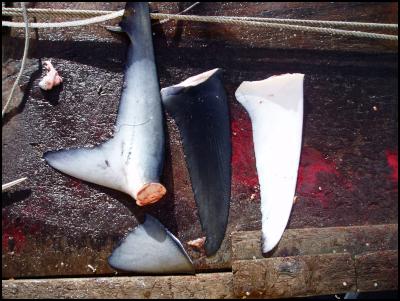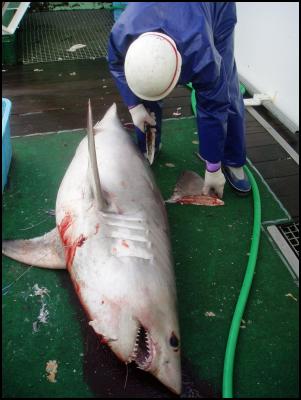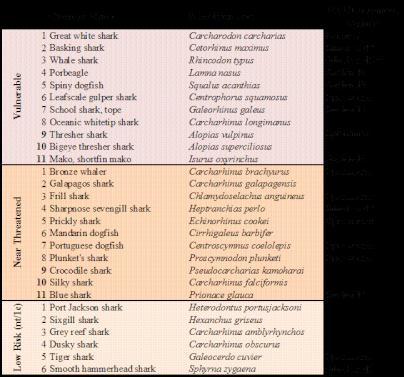Foodies and fishers sign up to stop shark finning
Foodies and fishers sign up to stop shark finning

Click to enlarge

Click to enlarge
26 August 2008 - Wellington
Forest & Bird media release for immediate use
Foodies and fishers sign up to stop shark finning
Some of New Zealand’s best-known foodies and fishers have signed Forest & Bird’s pledge to help stop shark finning.
Shark finning – cutting off the high-priced fins of sharks and dumping the rest of the body at sea – is contributing to the decline of shark species worldwide. While the practice is illegal in many countries, it is still permitted in New Zealand waters.
The shark finning pledge
We pledge our support for a ban on shark
finning in New Zealand waters because we are concerned that
shark finning is contributing to a decline in shark species
worldwide.
We pledge that we will:
• Not eat, make or
serve shark fin soup
• Avoid restaurants which sell
shark fin soup – or raise the issue with them if shark fin
soup is on their menu
• Not catch sharks just for their
fins
• Support a law change to make shark finning
illegal in NZ.
Signed by:
Foodies:
Simon Holst, food writer and stylist
Peter Calder, restaurant reviewer, Herald on Sunday
Peta Mathias, chef, author and TV presenter
Julie Le Clerc, chef, food writer and stylist
Richard Till, restaurateur, chef, food writer, TV presenter
Annabel Langbein, chef, food writer and sustainability campaigner
Fishers:
NZ Recreational Fishing Council
Forest & Bird Marine Advocate Kirstie
Knowles says shark fins are highly valued due to increasing
demand for their use in shark fin soup and traditional
medicines.
Approximately 112 species of sharks have been recorded in New Zealand waters. Of these, 28 are listed on the World Conservation Union (IUCN) Red List of species threatened with extinction. Only one threatened species – the great white shark – is protected in New Zealand.
Several countries, including Australia, the EU, USA, South Africa, Brazil, Canada, Ecuador, Mexico, Colombia, Nicaragua, Palau, Spain and Oman have banned the practice of finning – New Zealand hasn’t.
While it is illegal under New Zealand’s animal welfare laws to fin sharks while the sharks are still alive (though there is evidence that this still occurs), it is legal to fin them once they are dead and dump the rest of the carcass. Many sharks that are finned are caught as “by-catch” in other fisheries.
For example, the tuna long-line fisheries operating in our northern waters catch twice as many sharks as tuna. Of the 13 shark species caught between 2003-04 and 2005-06 in this fishery, 11 are listed on the IUCN Red List of threatened species.
Sharks are top predators – the
lions and tigers of our seas. They play an important role in
regulating our marine systems and their depletion can have
an impact throughout the food chain.
It is estimated that
100 million sharks are killed each year worldwide. Because
sharks are long-lived and slow to mature and breed, they are
highly vulnerable to over-fishing, Kirstie Knowles says.
“Shark finning is a wasteful practice which contributes to the decline of shark populations. Forest & Bird is asking for a law change to require sharks to be landed whole before processing, which would discourage wholesale exploitation of sharks and relieve pressure from over-fishing on shark populations.
“We’re grateful to the ‘foodies and fishers’ who have signed our pledge to help stop shark finning –and we invite the New Zealand public to also sign the pledge and help save our sharks.”
To sign the shark finning pledge, go to www.forestandbird.org.nz.
Threatened shark
species in New Zealand waters listed by the IUCN Red List of
threatened species, showing current New Zealand fisheries
management regime. (Species in bold are open water species
with threat status that has increased on the 2008 IUCN Red
List.)

Click for big version
Schedule 13 - Catch
limit at or above maximum justifiable yield
Schedule 14
- Arbitrary or internally agreed catch limit
Schedule 4C
- Moratorium on new permits
Open access - No catch
limits
* Being considered for addition to the Wildlife Act
ENDS


 Gordon Campbell: On Justin Trudeau’s Demise, In A Global Context
Gordon Campbell: On Justin Trudeau’s Demise, In A Global Context Climate Justice Taranaki: The Bill For Individualism, Corporations And Neoliberalism
Climate Justice Taranaki: The Bill For Individualism, Corporations And Neoliberalism Ministry For Culture & Heritage: New Zealand Flag Half-Masting To Mark The Funeral Of Senior Sergeant Lyn Fleming, NZ Police
Ministry For Culture & Heritage: New Zealand Flag Half-Masting To Mark The Funeral Of Senior Sergeant Lyn Fleming, NZ Police Child Poverty Action Group: Anti-poverty Groups Say Amendments To Social Security Act Will Remove Job Seekers’ Human Rights
Child Poverty Action Group: Anti-poverty Groups Say Amendments To Social Security Act Will Remove Job Seekers’ Human Rights Justice Committee: Justice Committee Reopens Submissions For Principles Of The Treaty Of Waitangi Bill To Tuesday 14 January
Justice Committee: Justice Committee Reopens Submissions For Principles Of The Treaty Of Waitangi Bill To Tuesday 14 January NZCAST: Survivors Of Abuse In Care Left Waiting - Urgent Action Needed Following Apology
NZCAST: Survivors Of Abuse In Care Left Waiting - Urgent Action Needed Following Apology Ōnuku Rūnanga: No One Wants Wastewater In Akaroa Harbour
Ōnuku Rūnanga: No One Wants Wastewater In Akaroa Harbour


